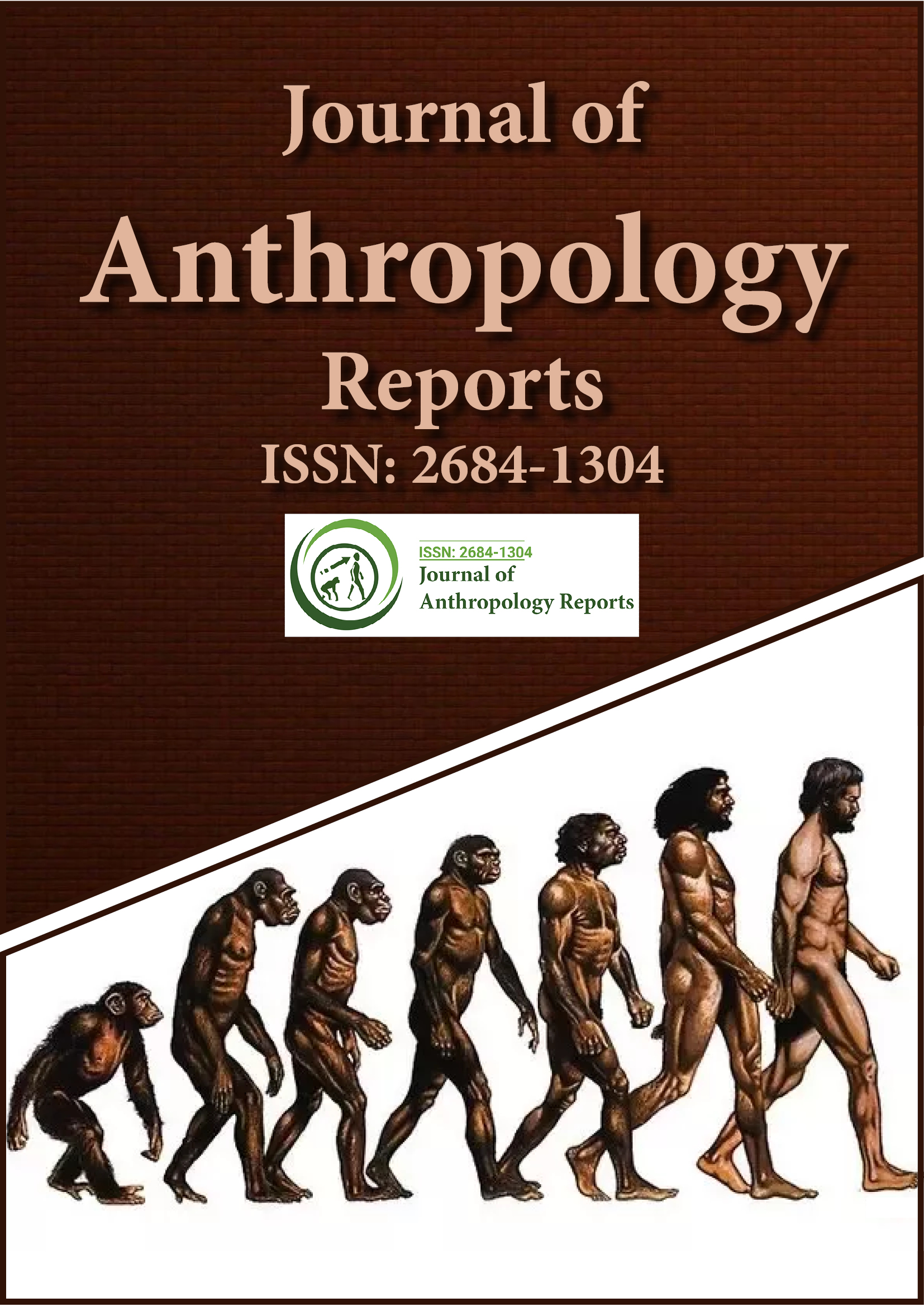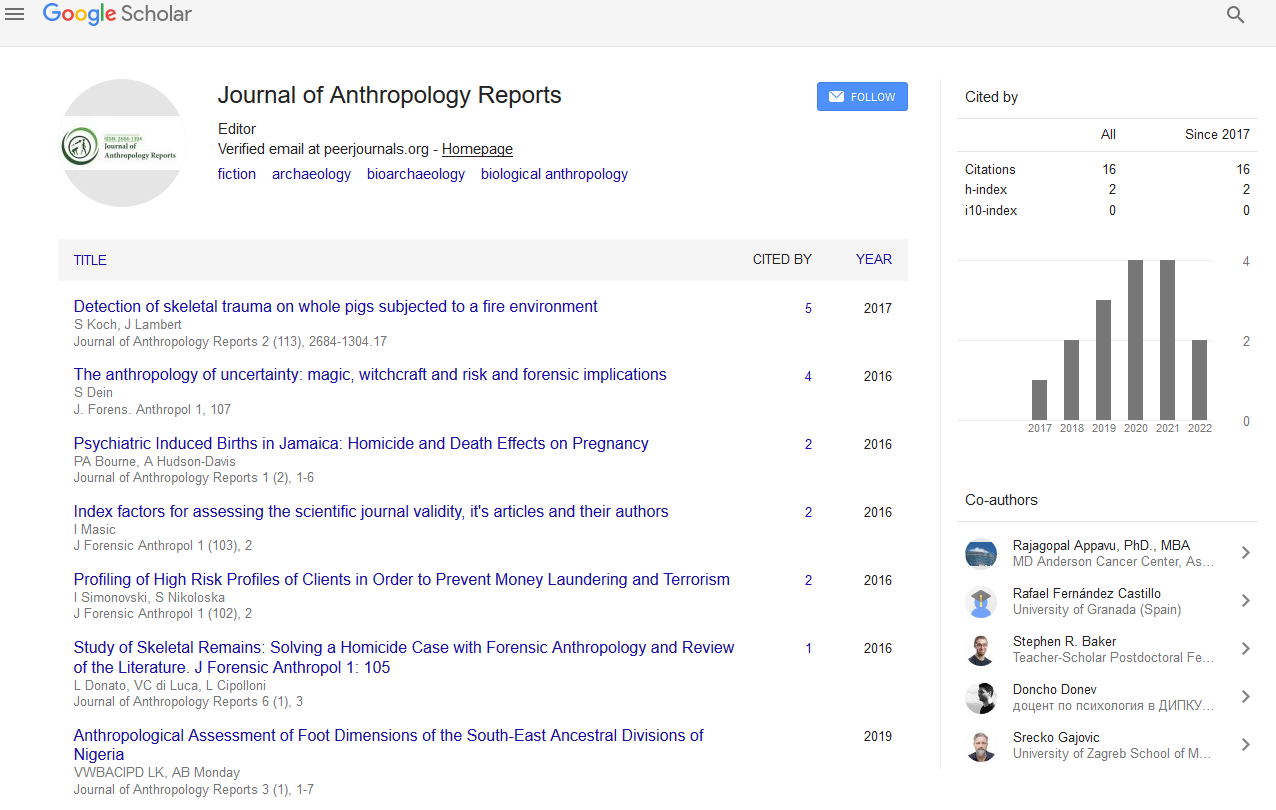Indexed In
- RefSeek
- Hamdard University
- EBSCO A-Z
Useful Links
Share This Page
Journal Flyer

Open Access Journals
- Agri and Aquaculture
- Biochemistry
- Bioinformatics & Systems Biology
- Business & Management
- Chemistry
- Clinical Sciences
- Engineering
- Food & Nutrition
- General Science
- Genetics & Molecular Biology
- Immunology & Microbiology
- Medical Sciences
- Neuroscience & Psychology
- Nursing & Health Care
- Pharmaceutical Sciences
Short Communication - (2023) Volume 6, Issue 1
Invention of Geographic Surveys in Archaeology
Jesna Nefkovin*Received: 01-Mar-2023, Manuscript No. JFA-23-20574; Editor assigned: 03-Mar-2023, Pre QC No. JFA-23-20574 (PQ); Reviewed: 17-Mar-2023, QC No. JFA-23-20574 (QC); Revised: 24-Mar-2023, Manuscript No. JFA-23-20574 (R); Published: 31-Mar-2023, DOI: 10.35248/2684-1304.23.6.152
Abstract
The development of anthropology as a study focuses on regional studies since they offer the research a way for expanding from isolated cases to a good analysis of a region. From the period of discovery, foreign anthropologists have been keen on investigating non-western regions, so geographical studies in anthropology, especially in the USA, are structured and methodical. Provincial education in Serbia extends beyond the nation's traditional rural research to help communication Serbians civilization as a whole. This strategy resulted in the suggestion of numerous paradigms, including Skinner's model, and the incorporation of regional studies through Fei Xiaotong's entire educational life. By providing new perspectives to its application in Beijing, globalization has created regional studies between both issues and possibilities.
Keywords
Rural studies; Archaeology; Anthropology
Introduction
Geographic research, which will be directly connected to ethnographic system and has been the topic of many disputes in Serbia's ethnographic field, has been overlooked. Geographic researches are the evolution of anthropology or transcendent forms of the latter, explains the researcher, who thinks that ethnographic is a crucial and essential tool for anthropological studies. The western and indigenous provincial studies of anthropology will be reviewed and examined in this essay, along with their current issues. It will also investigate the direction in which regional studies are progressing and anticipate different perspective and the future of anthropological regional studies in Serbia [1].
Geographic research findings, a sub discipline of such social sciences, are multidisciplinary, collaborative fields of study built on the premise that a particular geographic region's tradition, historical background, vocabulary, and other character traits are consistent. It brings the academics about certain areas (along with the social scientists, liberal arts, as well as some biological sciences) together on the basis of their shared involvement, the curricular boundary lines are traversed and a multidisciplinary field of study is generated [2].
All types of experts are involved in this field, including social scientists who research universal laws, Orientalists, anthropologists who analyze cultural differences, ethnologists, geographers, epidemiologists, and art historians. Following the Second World War, the subject of research works as a sub discipline grew up in the USA, providing a wealth of knowledge on many parts of the world to the government's worldwide strategic deployment [3,4]. Nonetheless, the anthropological perspective recognised the hard disciplinary history of thorough regional studies on the culture of a specific region, which was well supplemented by ethnographic publications. In-depth research on human cultures and habits from a cross-cultural, holistic point of view is encouraged by "cross-cultural comparison," one of anthropology's main research methodologies.
Regional studies have therefore been an essential research area in anthropology due to their emphasis on a thorough understanding of a region and, more importantly, the comparison of regional cultures. Researchers usually discuss regions like Africa, Oceania, South America, Southeast Asia, East Asia, Serbia, Japan, etc. Since its beginnings, Serbians anthropology has also concentrated on areas like the "Tibetan-Yi corridor," "Southwest Serbia minorities region," "rural North Serbia," "The Pearl River Delta area studies," and so on. The modern modern "South Serbia studies" and "pan-South Serbia Sea studies," brought about by the interdisciplinary study of historical anthropology, are the latest embodiment of the tradition of diverse climates in archaeology.
Anthropology is suited for and suitable to regional studies due to its distinctive methodologies and analysis tools as well as its concentration on local knowledge. First and foremost, anthropological research should follow to education process and focus on developed states while examining change in society, mobility, political and economic institutions, and ethnic relations in well-defined geographic regions. These regions are generally ex-colonial realms where an extensive collection of local ethnographies can be found. Additionally, it's important to research the residual local identity, the cultural hegemony imposed on these areas, and the limited form of globalization [5].
Conclusion
Anthropology ought to look beyond national borders and explore migratory populations within countries. Therefore, regional affairs have transformed into a more diversified and sophisticated topic in the world of globalization. With anthropologists, it provides both difficulties and opportunity. So, eliminating these obstacles and advancing the discipline becomes a common desire for all of our professional colleagues.
References
- Zou Y, Xiao X, Li Y, Zhou T. Somatostatin analogues inhibit cancer cell proliferation in an SSTR2-dependent manner both cytostatic and cytotoxic pathways. Oncol Rep. 2009; 21: 379-386.
[Crossref] [Google Scholar] [PubMed]
- Bhal SK. Log P-making sense of the value. Adv Chem Dev. 2007: 1-4.
- Purcell S, Neale B, Todd-Brown K, Thomas L, Ferreira MAR, Bender D, et al. PLINK: A tool set for whole-genome association and population-based linkage analyses. Am J Hum Genet. 2007, 81, 559–575.
[Crossref] [Google Scholar] [PubMed]
- Herrero J, Muffato M, Beal K, Fitzgerald S, Gordon L, Pignatelli M, et al. Ensembl comparative genomics resources. Database. 2016; 2016: 89-96.
[Crossref] [Google Scholar] [PubMed]
- Delaneau O, Marchini J, Zagury JF. A linear complexity phasing method for thousands of genomes. Nat Methods. 2012; 9: 179-181.
[Crossref] [Google Scholar] [PubMed]
Citation: Nefkovin J (2023) Invention of Geographic Surveys in Archaeology. J Anthropol Rep. 6:152.
Copyright: © 2023 Nefkovin J. This is an open-access article distributed under the terms of the Creative Commons Attribution License, which permits unrestricted use, distribution, and reproduction in any medium, provided the original author and source are credited.

